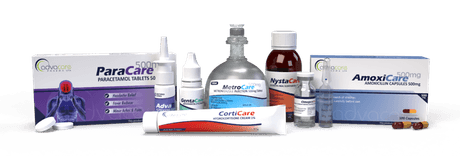Amikacin Injection
Amoxicillin + Clavulanate for Injection
Amoxicillin + Clavulanate Potassium for Oral Suspension
Amoxicillin + Clavulanate Potassium Tablets
Amoxicillin Capsules
Amoxicillin for Injection
Amoxicillin for Oral Suspension
Amoxicillin Tablets
Ampicillin + Cloxacillin Capsules
Ampicillin + Cloxacillin for Injection
Ampicillin Capsules
Ampicillin for Oral Suspension
Ampicillin Sodium + Sulbactam Sodium for Injection
Ampicillin Sodium for Injection
Azithromycin Capsules
Azithromycin for Oral Suspension
Azithromycin Tablets
Bacitracin Zinc Ointment
Cefadroxil Capsules
Cefalexin Capsules
Cefalexin for Oral Suspension
Cefazolin for Injection
Cefixime + Ofloxacin Tablets
Cefixime Capsules
Cefixime for Oral Suspension
Cefoperazone + Sulbactam for Injection
Cefoperazone Sodium for Injection
Cefotaxime Sodium for Injection
Cefoxitin Sodium for Injection
Cefpirome Sulfate for Injection
Cefpodoxime Tablets
Ceftazidime for Injection
Ceftriaxone + Sulbactam for Injection
Ceftriaxone Sodium for Injection
Cefuroxime Axetil Tablets
Cefuroxime for Injection
Chloramphenicol Capsules
Chloramphenicol Eye Drops
Chloramphenicol Eye Ointment
Chloramphenicol for Injection
Chlortetracycline Eye Ointment
Ciprofloxacin Eye Ointment
Ciprofloxacin HCl Eye Drops
Ciprofloxacin Injection
Ciprofloxacin Tablets
Clarithromycin for Oral Suspension
Clarithromycin Tablets
Clindamycin HCl Capsules
Cloxacillin Capsules
Cloxacillin Sodium for Injection
Dapsone Tablets
Dexamethasone + Neomycin Eye Drops
Doxycycline Capsules
Doxycycline Tablets
Erythromycin Enteric-Coated Tablets
Erythromycin Estolate Tablets
Erythromycin for Suspension
Erythromycin Gel/Solution/Eye Ointment
Erythromycin Lactobionate for Injection
Ethambutol HCl Tablets
Flucloxacillin Sodium for Injection
Fortified Penicillin G Procaine for Injection
Fosfomycin Calcium Capsules
Fosfomycin for Injection
Gentamicin Injection
Gentamicin Sulfate Cream/Ointment
Gentamicin Sulfate Eye Drops
Isoniazid Syrup
Isoniazid Tablets
Kanamycin Sulfate for Injection
Kanamycin Sulfate Injection
Levofloxacin Eye Drops
Levofloxacin Lactate Injection
Levofloxacin Tablets
Lincomycin Capsules
Lincomycin HCl Injection
Linezolid Injection
Linezolid Tablets
Metronidazole + Glucose Injection
Metronidazole Capsules
Metronidazole Injection
Metronidazole Suspension
Metronidazole Tablets
Moxifloxacin Eye Drops
Moxifloxacin Injection
Mupirocin Ointment/Cream
Neomycin Sulfate Tablets
Netilmicin Sulfate Injection
Nitrofurantoin Capsules
Nitrofurantoin Tablets
Norfloxacin Eye Drops
Norfloxacin Tablets
Ofloxacin Eye Drops
Ofloxacin Injection
Ofloxacin Solution/Suspension
Ofloxacin Tablets
Ornidazole Injection
Oxacillin Sodium Capsules
Oxacillin Sodium for Injection
Oxytetracycline Capsules
Pefloxacin Tablets
Penicillin 6.3.3. for Injection
Penicillin G Benzathine for Injection
Penicillin G Potassium for Injection
Penicillin G Procaine for Injection
Penicillin G Sodium for Injection
Penicillin V Tablets
Pipemidic Acid Tablets
Piperacillin Sodium + Tazobactam Sodium for Injection
Rifampicin + Isoniazid + Pyrazinamide Tablets
Rifampicin + Isoniazid Tablets
Rifampicin Capsules
Roxithromycin Tablets
Sodium Fusidate Ointment
Streptomycin for Injection
Sulfacetamide Eye Drops
Sulfamethoxazole + Trimethoprim (Co-Trimoxazole) for Oral Suspension
Sulfamethoxazole + Trimethoprim Oral Suspension
Sulfamethoxazole + Trimethoprim Tablets
Tetracycline HCl Capsules
Tetracycline HCl Eye Ointment
Tinidazole Injection
Tinidazole Tablets
Tobramycin Eye Drops
Tobramycin Eye Ointment
Triple Antibiotic Ointment
Vancomycin for Injection


